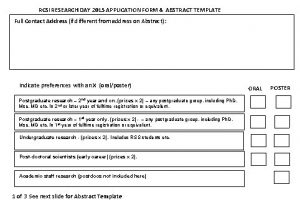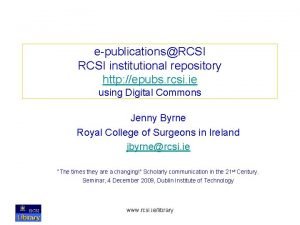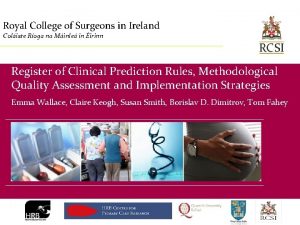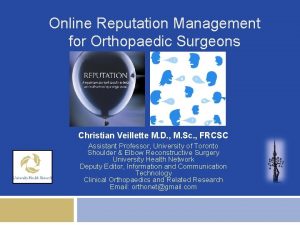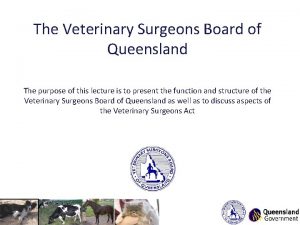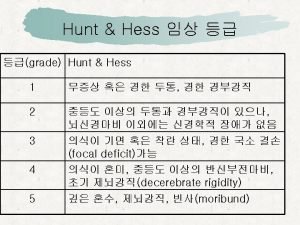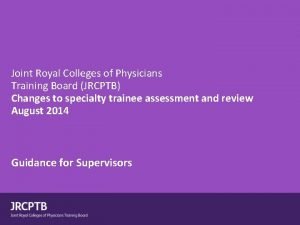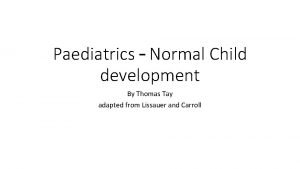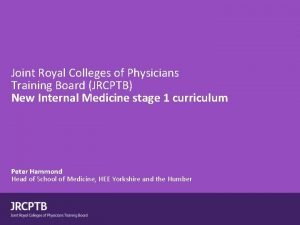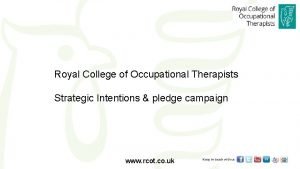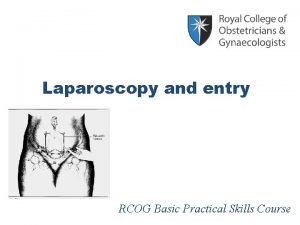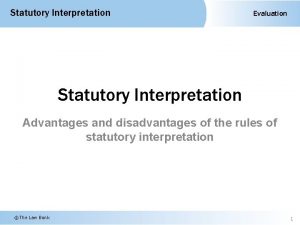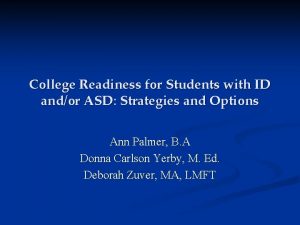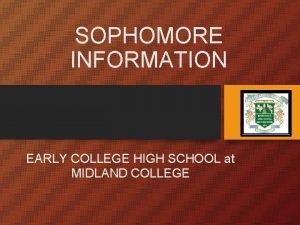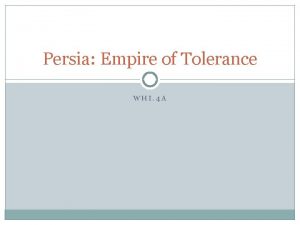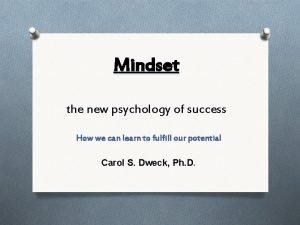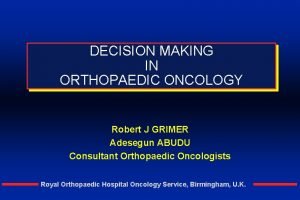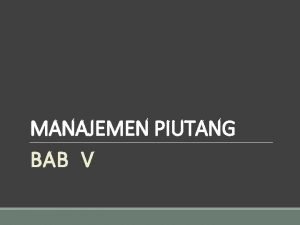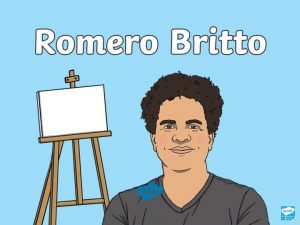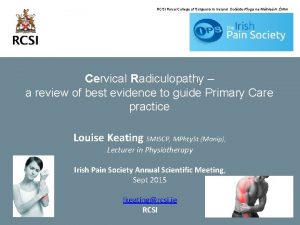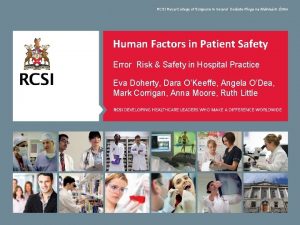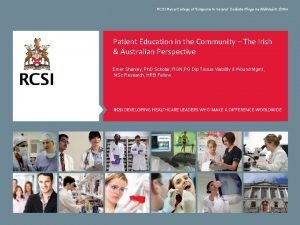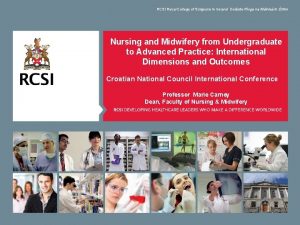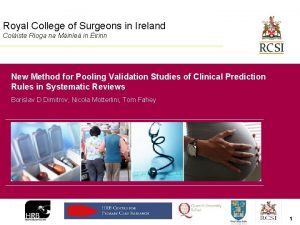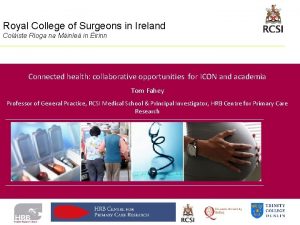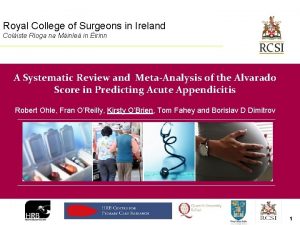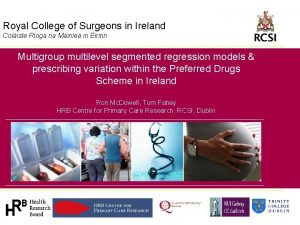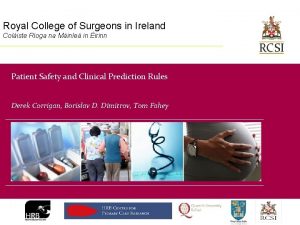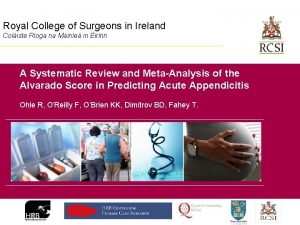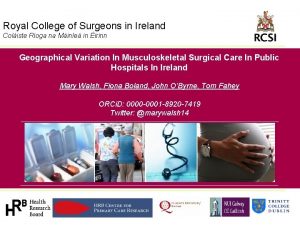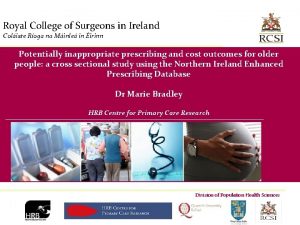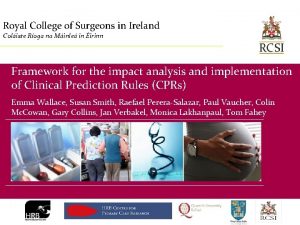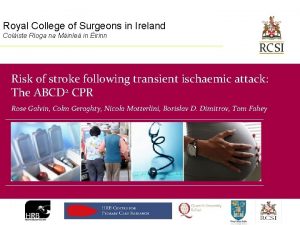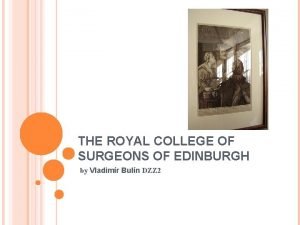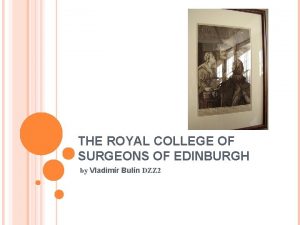RCSI Royal College of Surgeons in Ireland Coliste




































- Slides: 36

RCSI Royal College of Surgeons in Ireland Coláiste Ríoga na Máinleá in Éirinn Talking to Patients and Relatives Angela O`Dea, Marie Morris, Peter Gillen

Objectives for today: • Identify the communication techniques which can be used with emphasis for challenging consultations with patients and their relatives • Discuss the relevant research evidence regarding communication issues with patients and relatives • Practice using the skills of Breaking Bad News

• What are the difficult conversations that you face? • What kinds of conversations or situations require expert communication skills? • What makes them challenging?

What difference do communication skills make?

Evidence • blood sugars (Hb. A 1 c) • metabolic complications (hyperosmolar state, diabetic ketoacidosis, coma) • systolic blood pressure • Asthma control • Quality of Life and self efficacy

post-op pain headache return visits length of stay

§ Patient…… Engagement Adherence Satisfaction 20%

reductions in legal action reductions in complaints patient satisfaction

Problem/Diagnosis Outcome Fibromyalgia Pain, dep. , functioning Smoking cessation Osteoarthritis Pain Diabetes BP, serum levels Diabetes BP, serum, Psychosocial Hypertension BP Cancer Anxiety, Depression Asthma Qo. L Osteoarthritis Pain Diabetes Weight loss Lower resp. infection Return Consultations Somatic complaints Quality of Life Obesity Weight loss

Burnout

Empathy and job satisfaction/burnout Doctors with high empathy scores have higher job satisfaction and lower burnout.

Communication skills training works and…… leads to improved patient outcomes

q …. Up to 50% of patients complaints/concerns are not elicited In 50% of doctor patient interactions, doctors and patients do not agree afterwards what the plan is Doctors and patients agree on the chief complaint in 76% of somatic problems and in only 6% of psychosocial problems Doctors interrupt patients at the beginning of the consultation after 11/12 seconds. 50 % of medications are wasted Between 10% - 90 % patients are non adherent to medical recommendations

One way of breaking bad news

Spot the skills • https: //vimeo. com/141213476

Patient presents problem: gathering information - parallel search of two frameworks The bio-medical perspective (Disease framework) Sequence of events Symptoms & signs Investigations Underlying pathology Differential diagnosis The patient’s perspective (Illness framework) Ideas & beliefs Concerns & feelings Expectations Effects on life Understanding the patient’s unique experience of illness Integration of the two frameworks Collaborative explanation and planning: shared understanding and decision making

Initiating the session Providing structure Gathering information Physical examination Explanation and planning Closing the session Building the relationship

Kaiser Permanente • The Four Habits are: 1. Invest in the Beginning 2. Elicit the Patient’s Perspective 3. Demonstrate Empathy 4. Invest in the End

Breaking Bad News: SPIKE • • • Setting up Perception Invite the patient Knowledge Emotions

Gathering information exercise • • • Instructions: Divide up into teams of three: Player A Player B Referee • Player A : Think of a car. • Player B : Find out what kind of car player A is thinking of. • RULE: Player B is not allowed to ask direct questions about the make and model. Player A is not allowed to tell player B what the make and model is until correctly guessed. • Referee: Ensures rule is not broken. • The winning team is the team who gets the right answer first.

Getting things off to a good start… » Introduction and agenda » Use of open and closed questioning » Identify patient’s/relative’s starting point » Try not to interrupt !


Effective communication skills » Attentive listening » Attend to verbal and non-verbal cues » Avoidance of medical terminology- Jargon

Jargon !

Making the conversations easier… » Use of “signposting” » The `warning shot’ for BBN » Periodic summarising » Chunk and check information » Checks patients understanding » Summarises briefly and clarifies plan of action

Empathy • The art of demonstrating that you ‘get’ the emotion behind what is being expressed

Empathy versus sympathy and compassion • Empathy is a skilled response • Sympathy and compassion are reactive responses. • Developing the skill of empathy is a more realistic goal for medical education. • Emotional insights should inform clinical decision making

Empathy • https: //www. youtube. com/watch? v=-4 EDhd. AHr. Og

Name it!

Empathy saves time Physicians interrupt after 18 seconds It takes patients 2. 5 minutes on average to tell their story – uninterrupted. • Empathy saves time overall

Power of empathy

How we assess communication skills

Online review of skills

Practice Cancelled Op video – Communication with the patient • Good and bad versions

Practice RTA - communication with relative Videos • RTA 2 first 4 mins 25 seconds • RTA 1 Second 5 mins 18 seconds

Afternoon Practice 6 cases 20 minutes per case Facilitated by Faculty One trainee interacts with each patient – others observe and give feedback 1. SHO – Surgery on call/ SHO ED on call
 Rcsi poster template
Rcsi poster template Rcsi repository
Rcsi repository Judith gilroy rcsi
Judith gilroy rcsi Rcsi research day
Rcsi research day Coliste
Coliste Reputation management for surgeons
Reputation management for surgeons Qld vet surgeons board
Qld vet surgeons board Wfns score
Wfns score Ghana physicians and surgeons foundation
Ghana physicians and surgeons foundation Jcrptb
Jcrptb Powell v kempton park racecourse
Powell v kempton park racecourse Thomas tay
Thomas tay Imt group 2 specialties
Imt group 2 specialties Royal military college of science
Royal military college of science Royal college of occupational therapists
Royal college of occupational therapists Rcog basic practical skills
Rcog basic practical skills Advantages of purposive approach
Advantages of purposive approach Asd college college readiness program
Asd college college readiness program Early college high school at midland college
Early college high school at midland college How did the royal road benefit the persians?
How did the royal road benefit the persians? Royal icing ce
Royal icing ce Royal mindseto
Royal mindseto Professor abudu royal orthopaedic hospital
Professor abudu royal orthopaedic hospital French royal family
French royal family Queen's sons
Queen's sons The royal serial
The royal serial Royal psalms
Royal psalms Rumus menghitung cash conversion cycle icp
Rumus menghitung cash conversion cycle icp Kth royal institute of technology notable alumni
Kth royal institute of technology notable alumni How did william and henry increase royal power
How did william and henry increase royal power Royal skin care
Royal skin care Windsors family tree
Windsors family tree Cigaronne royal slims
Cigaronne royal slims Iklan nutrilon royal
Iklan nutrilon royal Persian royal road
Persian royal road Romero britto person
Romero britto person Bel royal school
Bel royal school
